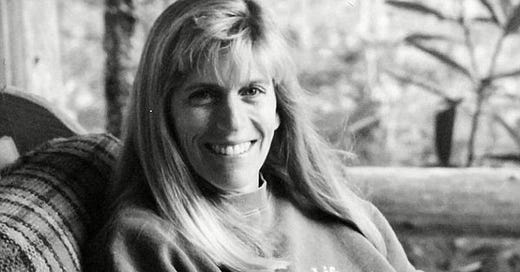Turning Tragedy into Triumph: (part of) the Story of Julie Stimpson-Lewis
To say that Julie Stimpson-Lewis is the kind of person who knows how to make the best of a bad situation would be an understatement of…
To say that Julie Stimpson-Lewis is the kind of person who knows how to make the best of a bad situation would be an understatement of epic proportions.
In 1984, after giving birth to her first daughter, she had complications and needed a blood transfusion. That’s when she became infected with HIV.
She didn’t learn about that fact until years later.
When she was finally diagnosed in 1990 the prognosis was not good. Doctors expected her to live just a few years.
Yet thanks to rapidly advancing research and development, medical technology and cutting-edge therapies available in the U.S., Julie lived and fought on despite the bleak odds originally.
Now, 35 years later, not only has she has outlived that grim prognosis but she has even turned the table in a way.
After receiving the bad news, Julie spent 10 years in the public sector working with the Spokane Regional Health District and the Spokane AIDS network.
By that time she had already given birth to two other children, her second daughter Laura and her son Ryan. Both had a 25% chance of being born HIV positive. Both were extremely fortunate to not be infected.
Wanting to find a way to celebrate her amazing journey and use her passion for community health, she started the 30/30 Project with the support of her family (more on that later).
The project’s goal was simple in theory but challenging to execute: to build 30 health centers around the world that will operate for at least 30 years.
Julie was already poised to make that goal a reality since she was working on vetting projects for an organization called Construction for Change, a Seattle based nonprofit construction company building a sustainable infrastructure for other nonprofits across the world.
As the AIDs and HIV crisis began to improve and even abate, becoming almost manageable in the US, Julie said she was noticing people in some of the poorest regions in the world were still woefully underprepared. When it came to AIDs prevention and even access to the most basic healthcare, folks in developing countries were falling even farther behind.
“I did a lot of work domestically but as things were improving in the US healthcare in general they weren’t elsewhere,” she said. “Especially in rural areas of Africa and India in particular — they just don’t have the access to options that other people have.”
In just five years, she and her team at the 30/30 Project (in partnership with Construction for Change), completed all of those 30 building projects across four continents. These facilities provide access to quality, affordable healthcare to those who need it most — women, girls and families who haven’t had the same access to healthcare that she had.
“Because I was infected with HIV in a maternity ward, those two things have always been big in my mind.”
Raising the money to fund all 30 projects was a big job, and it helped to have some star power to back her up. Star-power from one of hip hop’s biggest acts – Grammy award winning duo Macklemore and Ryan Lewis.
Ryan Lewis, you see, is Julie’s son.
When the project launched, his publicist helped get Julie on national talk shows like “Good Morning America” and donated personally to the cause as well as led efforts to raise funds through crowd-source funding platforms like Indie GoGo.
Macklemore and Ryan Lewis’ clout also helped bring major sponsors like T-Mobile and Microsoft on board.
“It helped a lot to have a hip hop group behind our launch.”
During our interview, Julie told me that these healthcare facilities have become much more than just a place to see a doctor. Because they have reliable power they’re a place to charge your mobile phone. They’re places for children to study after the sun has set. They have become beacons of light, literally, they are gathering places for entire communities after the sun sets. These are people who otherwise mostly live in the dark or by firelight after the sun has dipped beyond the horizon.
The 30/30 Project’s impact extends way beyond healthcare – her impact.
In 2015, she was the recipient of the Nelson Mandela Changemaker Award, presented by the Africa Rising Foundation, the Nelson Mandela Foundation and PTTOW (Plan To Take On the World). She traveled to South Africa to accept the honor, and met and befriended some of Mandela’s children and family members.
Now that the 30/30 Project is winding down, Julie said she’s not quite ready to retire yet but she is ready for the chance to rest, recharge and focus on her own health.
If you would like to learn more about the 30/30 Project and Stimpson-Lewis’ work, check out this official video and visit 3030project.org.
This is a feature article I wrote for the Eastmont School District’s most recent newsletter. Julie Stimpson-Lewis is an Eastmont High School Class of 1976 graduate and is being honored as the district’s Distinguished Alumnus for 2019.





